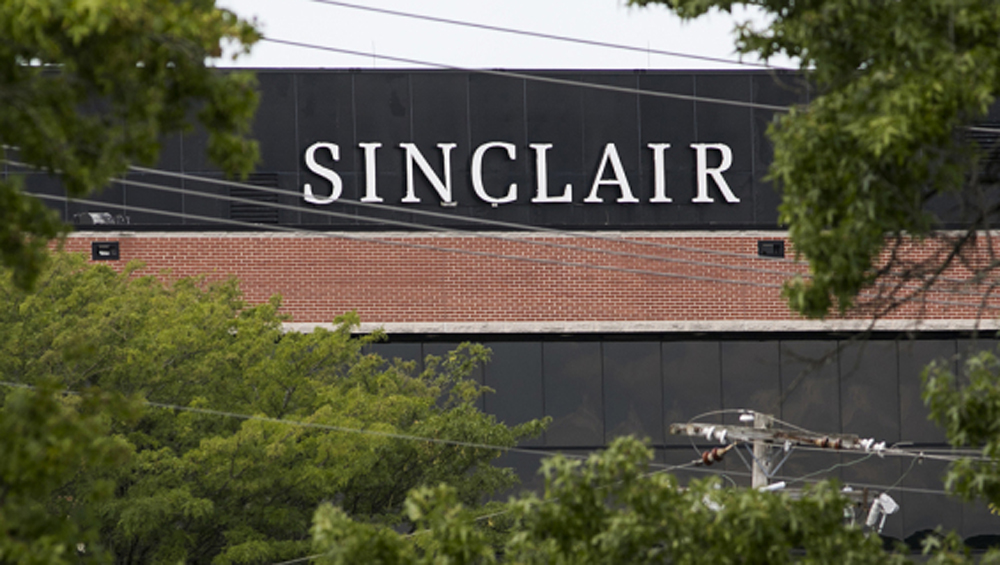
Sinclair Forecasts Media Revenue Decline For First Quarter

Coming off a record year in 2022, Sinclair Broadcast Group is telling Wall Street to expect a slower start to 2023.
Fourth quarter media revenues were up 19% to $952 million, driven by higher political ad revenue and higher core advertising, offset by lower distribution revenues and a lower management fee from the regional sports networks (RSNs), EVP-CFO Lucy Rutishauser told analysts this morning. She noted that 4Q of 2021 had included a cybersecurity ransomware incident at Sinclair, which negatively impacted media revenues by approximately $63 million.
“Adjusting for the cyber incident impact, media revenues would have been up 10%. For the year, media revenues were also up 10%, or almost 8% cyber-adjusted,” she said.
“Total advertising for the quarter and the year were record highs, driven by strong political revenues. Compared to the last mid-term election year, 2018, total advertising was up 3% for both the quarter and the year. Total advertising for the fourth quarter increased almost 60% over 2021, or up 31% [to $503 million] when adjusted for the cyber incident. Core advertising, adjusted for the cyber incident, declined high single digits on political crowd-out, which was expected given the record levels of political,” she continued.
Click here for the full report released this morning by Sinclair.
“Turning to our first quarter ’23 guidance, as it relates to comparisons with Q1 of 2022, we will talk to pro formas, which exclude Diamond [RSNs], which was deconsolidated in March of 2022 and was in two months of our actuals last year. We expect media revenues to decrease approximately six to nine percent versus first quarter 2022’s pro forma media revenues of $818 million. First quarter’s core advertising is expected to be dragged down a single-digit percent versus first quarter of last year, with the decline largely driven by macro-economic weakness,” Rutishauser told analysts.
Because of the cyber incident impact last year, COO and Broadcasting President Robert Weisbord looked back to the previous mid-term election four years ago to assess ad trends pre- and post-election.
“In both elections, December was a weak month … and that weakness has extended into first quarter of this year, albeit at a lower percentage decline. Pacings for January and February are down at low single-digits versus last year, aided by the Super Bowl running on Fox this year, while March is pacing slightly higher, but the month has not broken yet,” he said.
“For the first quarter of 2023 we are seeing growth in several categories, including auto, legal, and entertainment. And sports betting is relatively flat — an improvement from last year’s trend as new gaming markets came online in Ohio and Maryland. Services continues to be weaker,” he said, adding that pharmaceuticals is another category showing weakness.
In Q&A Weisbord was asked to compare trends for local and national advertising.
“Local was strong in January and February. The weakness we’re seeing is really on the national side. We continue to think that we’ll see that. We’re not seeing any cancellations at all. What we’re seeing is close in [orders] and that’s why March is lagging right now. We expect the orders to start coming at the end of this week and the beginning of next week. And with our large CBS [affiliate group] we’ll be able to take advantage of March Madness, the tournament event,” he said.
“Automotive has rebounded — off of a lower basis point. There is inventory on the lots — the Tier 3 lots. Even though interest rates are up, people are still buying cars. I’ve had several conversations with mega-dealers. The purchasing of cars during the COVID cycle, it was really used that was driving it, because there was no new. And now they’re having shipments received at tier three level, so that bodes well for us,” Weisbord said.
Sinclair’s CBS stations and those of many other CBS affiliates are off the Fubo TV streaming service, after the network’s affiliate board rejected the payment terms that CBS-owner Paramount Global negotiated with the virtual MVPD. One analyst wanted to know if a similar outcome is likely for YouTube TV when its agreement comes up for renewal this year.
“I think this will actually get resolved, in terms of Fubo, and YouTube we’ll have to see,” Sinclair President-CEO Chris Ripley said.
“My take on it is that it will be resolved at some point between us and the networks in the next couple of months. I think the bigger issue that we’re highlighting is one of equity in terms of how virtuals are dealt with versus traditionals. That is something that there’s a growing consensus in the industry and within DC that that needs to change,” Ripley said.
The Sinclair CEO and many of his corporate peers want to be able to negotiate carriage rights directly with the vMVPDs for their local stations, just as they do now with the traditional cable and satellite companies. They don’t think they are getting full value for their local programming with the networks handling the negotiations.
Sinclair also announced today that its board of directors has declared a quarterly cash dividend of $0.25 per share on the company’s Class A and Class B common stock. The dividend is payable on March 17 to the holders of record at the close of business on March 3.
























Comments (0)